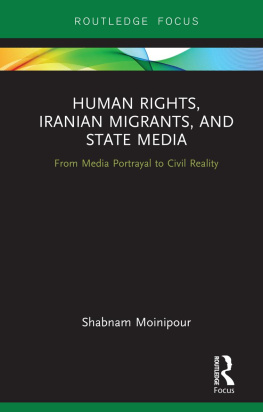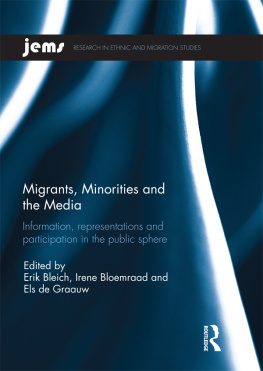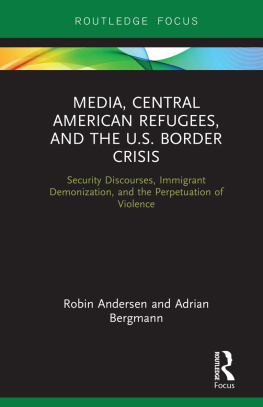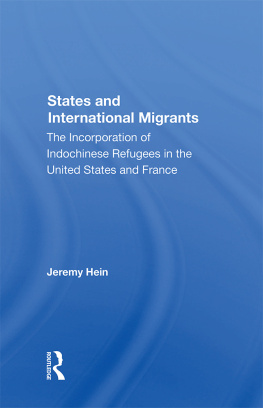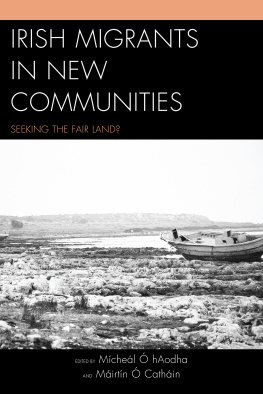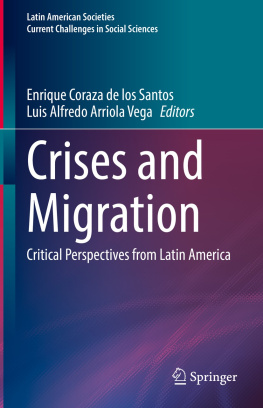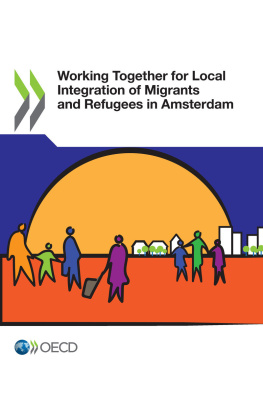Kirsten Forkert - How Media and Conflicts Make Migrants
Here you can read online Kirsten Forkert - How Media and Conflicts Make Migrants full text of the book (entire story) in english for free. Download pdf and epub, get meaning, cover and reviews about this ebook. year: 2020, publisher: Manchester University Press, genre: Politics. Description of the work, (preface) as well as reviews are available. Best literature library LitArk.com created for fans of good reading and offers a wide selection of genres:
Romance novel
Science fiction
Adventure
Detective
Science
History
Home and family
Prose
Art
Politics
Computer
Non-fiction
Religion
Business
Children
Humor
Choose a favorite category and find really read worthwhile books. Enjoy immersion in the world of imagination, feel the emotions of the characters or learn something new for yourself, make an fascinating discovery.

- Book:How Media and Conflicts Make Migrants
- Author:
- Publisher:Manchester University Press
- Genre:
- Year:2020
- Rating:4 / 5
- Favourites:Add to favourites
- Your mark:
- 80
- 1
- 2
- 3
- 4
- 5
How Media and Conflicts Make Migrants: summary, description and annotation
We offer to read an annotation, description, summary or preface (depends on what the author of the book "How Media and Conflicts Make Migrants" wrote himself). If you haven't found the necessary information about the book — write in the comments, we will try to find it.
How Media and Conflicts Make Migrants — read online for free the complete book (whole text) full work
Below is the text of the book, divided by pages. System saving the place of the last page read, allows you to conveniently read the book "How Media and Conflicts Make Migrants" online for free, without having to search again every time where you left off. Put a bookmark, and you can go to the page where you finished reading at any time.
Font size:
Interval:
Bookmark:
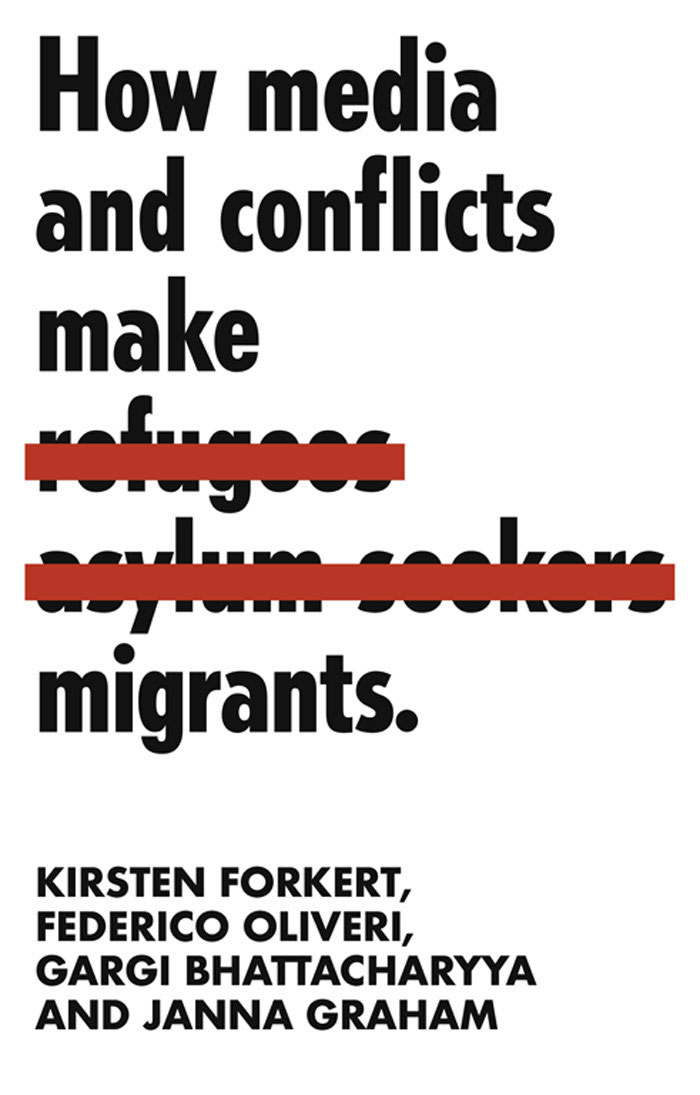
How media and conflicts make migrants

How media and conflicts make migrants
Kirsten Forkert, Federico Oliveri, Gargi Bhattacharyya and Janna Graham
Manchester University Press
Copyright Kirsten Forkert, Federico Oliveri, Gargi Bhattacharyya and Janna Graham 2020
The rights of Kirsten Forkert, Federico Oliveri, Gargi Bhattacharyya and Janna Graham to be identified as the authors of this work have been asserted by them in accordance with the Copyright, Designs and Patents Act 1988.
Published by Manchester University Press
Altrincham Street, Manchester M1 7JA
www.manchesteruniversitypress.co.uk
British Library Cataloguing-in-Publication Data
A catalogue record for this book is available from the British Library
ISBN 978 1 5261 3811 8 hardback
ISBN 978 1 5261 3813 2 paperback
First published 2020
The publisher has no responsibility for the persistence or accuracy of URLs for any external or third-party internet websites referred to in this book, and does not guarantee that any content on such websites is, or will remain, accurate or appropriate.
Typeset
by Toppan Best-set Premedia Limited
We wish to thank the participants and co-researchers who have been involved in our project in the UK and Italy. We thank the members of Birmingham Asylum and Refugee Association (BARA), and the Women's Cultural Forum, now known as Global Sistaz United, for sharing their thoughts, insights, experiences and perspectives about global conflicts, legacies of colonialism and the institutionalised cruelty of the immigration system. We thank the Exiled Journalists Network for their co-operation and participation. We also wish to thank Cantieri Meticci for working with us on the fieldwork in Italy and in developing our findings into theatrical form. We are grateful to Implicated Theatre and, in particular, Amal Khalaf, Aissata Tham and Francis Rifkin for making the UK theatrical production possible and helping us find ways to tell stories otherwise. We also thank Viviana Salvati, as the main author of the Italian script, Francesco Simonetta, as stage director of the mise en espace in Bologna, and Youssef El Gahda, Francesca Falconi, Boubacar Ndia, Jan Nawaz, Abraham Tesfai, as the readers of the mise en espace. We would like to thank Nicholas Vass for his assistance with the Alternative Newspaper workshop images, Olivia Swinscoe for photographing the Birmingham performance and Vika Nightingale for photographing the Nottingham performance. Kirsten would like to thank her colleagues and students at Birmingham City University (BCU) for their support and insights, and the support of the Faculty Research Investment Scheme in writing this book. She also thanks her partner Peter Conlin for being there throughout the project and the writing of the book.
This project would not have been possible without the support of the AHRC's Innovation Award (AH/N008200/1) and so we wish to thank the funder for enabling us to carry out this work. In addition, we thank BCU and the University of East London for their contributions towards the dissemination of this work.
When we embarked on the work that informs this book, the term refugee crisis had only recently re-entered European debate. Since that time, considerable energies have been devoted to explaining and critiquing the framing of crisis and the events leading to unprecedented numbers of people in need moving across the globe. This project also reflects on this context where displaced populations meet anti-migrant anxieties, but we have attempted to reframe the discussion to unsettle what has become an increasingly predictable and frozen interchange between irreconcilable points of view.
The book explores how global conflicts are understood as they relate to the European refugee crisis, which has been framed simultaneously as a humanitarian emergency and a security threat. We examine how global conflict has been constructed through media representations, official and popular discourses, and institutional and citizen-led initiatives (such as the many Facebook groups that developed if only for a brief moment for hosting refugees and sending donations to refugee camps). We explore how this understanding in turn shapes institutional and popular responses in receiving countries, ranging from hostility such as the framing of refugees by politicians, as economic migrants who are abusing the asylum system to solidarity, as in the grassroots citizen initiatives we have mentioned.
The book focuses on the UK and Italy, two countries that have experienced mistrust towards European institutions (intertwined with debates around migration in relation to conflict), connected to disaffection with mainstream politics. Both have faced internal political controversy in response to population movement in the wake of conflict. In both countries, concerns about the role and efficacy of European institutions have converged with debates about borders and sovereignty. In the UK, this is exemplified by the Brexit vote and the mobilisation of xenophobia by the campaign to leave the EU, and in Italy by the anti-asylum and anti-NGO policies of the right-wing coalition government and especially of the Eurosceptic, far-right former Deputy Prime Minister and Minister of the Interior, Matteo Salvini. Both countries have also seen the development of grassroots refugee solidarity movements, though as will be seen these have their limitations.
Our work began with a question about how popular understandings of global conflicts come about. The discussion of Europe's responsibilities to people in movement has resurrected questions about the interdependency of the international community, our responsibilities to each other and the terms of international law. We argue that limited knowledge about the histories and challenges facing different regions of the world particularly involving the legacy of Western intervention in these countries leads to an inability to comprehend contemporary global conflicts and also those who have fled those conflicts. In so doing we consider the habits of media use that inform audiences in Italy and the UK, as well as the frameworks of representation utilised by mainstream media to depict global conflict and European interests. We begin from the perspective that the range and manner of contemporary media use is a significant factor in analyses of attitudes to migration, not only in relation to the representation of migrants and migration but also in relation to the larger framing of global interconnectedness and mutual responsibility. In particular, media representations play a central role in popular understandings of global conflicts and other international events. In times of changing global relations and large-scale population movements, what is understood and believed about global events becomes uncertain and, we argue, this uncertainty shapes attitudes to political institutions and to migration.
Popular understandings of war in recent decades have been refracted through media representations, both the adventures and emotions of war movies and the changing framing of news reporting. Until recently, scholars of international relations and of media studies could feel confident in their identification of the central media accounts of influence. Media institutions could be placed alongside other pillars of power and influence, with overlapping membership and interests charted. We might employ techniques from audience studies to explore the diversity of interpretations in play, but there was a sense of agreement about which text were under consideration.
Font size:
Interval:
Bookmark:
Similar books «How Media and Conflicts Make Migrants»
Look at similar books to How Media and Conflicts Make Migrants. We have selected literature similar in name and meaning in the hope of providing readers with more options to find new, interesting, not yet read works.
Discussion, reviews of the book How Media and Conflicts Make Migrants and just readers' own opinions. Leave your comments, write what you think about the work, its meaning or the main characters. Specify what exactly you liked and what you didn't like, and why you think so.

